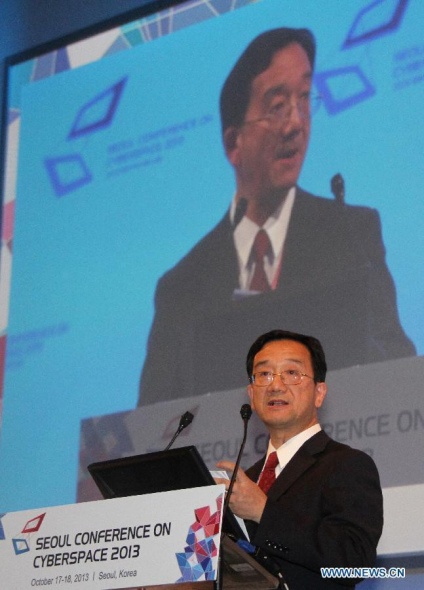

Huang Huikang, legal advisor and Director-General of the Department of Treaty and Law under Chinese Foreign Ministry, speaks during the Seoul Conference on Cyberspace 2013 in Seoul, capital of South Korea, Oct. 17, 2013. The two-day conference opened here Thursday. (Xinhua/Yao Qilin)
Developing countries should enjoy more opportunities from the cyberspace and receive further help from the international communities, a Chinese official said on Thursday at an ongoing international conference on cyberspace in South Korea's capital Seoul.
"We should attach great importance to and enhance capacity building in developing countries, narrow down the digital divide, and promote balanced progress in global informatization," said Huang Huikang, legal advisor and Director-General of the Department of Treaty and Law under Chinese Foreign Ministry.
Huang said the international community should make sure the lawful rights and interests of developing countries are not compromised because of disparity in capacity.
He noted that it is the first time that the cyberspace conference of this kind was held in Asia, a region with nearly half of the global internet users and a region with dynamic economic and profound history, which make Seoul conference a bit different from the previous ones held in Budapest in 2012 and in London in 2011.
Huang added that he was happy to see more delegates from developing countries in Asia and the Middle East share their own opinions at the conference this year.
He emphasized China's standpoint of building a peaceful, secure, open and cooperative cyberspace, eliminating all forms of "hot war," "cold war" or "cool war" from it.
"International cyberspace governance must follow the principle of state sovereignty and non-interference in other's internal affairs enshrined in the UN Charter," said Huang, adding that China hopes the cyberspace can be a platform for various countries and peoples to carry out equal-footed exchanges and learn from each other.
Considering there are no universally recognized rules for combating cybercrimes or an international code of conduct in cyberspace, or an international mechanism for cyber governance, Huang also called for strengthening international cooperation on the establishment of new legal rules and regulations.
The two-day Seoul Conference on Cyberspace 2013 kicked off on Thursday, gathering more than 1,000 representatives from some 90 countries and international and regional organizations.
Under the theme of "Global Prosperity through an Open and Secure Cyberspace -- Opportunities, Threats and Cooperation," the forum focuses on a wide range of cyberspace issues such as cybersecurity, cybercrimes and the Internet economy and social benefits of cyberspace.
Copyright ©1999-2018
Chinanews.com. All rights reserved.
Reproduction in whole or in part without permission is prohibited.